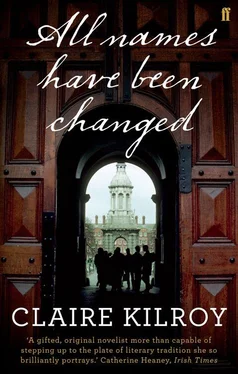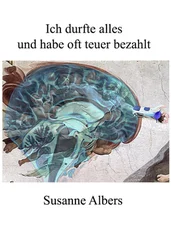Claire Kilroy - All Names Have Been Changed
Здесь есть возможность читать онлайн «Claire Kilroy - All Names Have Been Changed» весь текст электронной книги совершенно бесплатно (целиком полную версию без сокращений). В некоторых случаях можно слушать аудио, скачать через торрент в формате fb2 и присутствует краткое содержание. Год выпуска: 2010, Издательство: Faber & Faber, Жанр: Современная проза, на английском языке. Описание произведения, (предисловие) а так же отзывы посетителей доступны на портале библиотеки ЛибКат.
- Название:All Names Have Been Changed
- Автор:
- Издательство:Faber & Faber
- Жанр:
- Год:2010
- ISBN:нет данных
- Рейтинг книги:5 / 5. Голосов: 1
-
Избранное:Добавить в избранное
- Отзывы:
-
Ваша оценка:
- 100
- 1
- 2
- 3
- 4
- 5
All Names Have Been Changed: краткое содержание, описание и аннотация
Предлагаем к чтению аннотацию, описание, краткое содержание или предисловие (зависит от того, что написал сам автор книги «All Names Have Been Changed»). Если вы не нашли необходимую информацию о книге — напишите в комментариях, мы постараемся отыскать её.
All Names Have Been Changed — читать онлайн бесплатно полную книгу (весь текст) целиком
Ниже представлен текст книги, разбитый по страницам. Система сохранения места последней прочитанной страницы, позволяет с удобством читать онлайн бесплатно книгу «All Names Have Been Changed», без необходимости каждый раз заново искать на чём Вы остановились. Поставьте закладку, и сможете в любой момент перейти на страницу, на которой закончили чтение.
Интервал:
Закладка:
Aisling steadily drank the fresh pint Glynn had ordered, as if it were a grim task he had set her. You had to admire her determination. He and Antonia were locked into some class of battle which was simultaneously hushed and frantic. Their facial expressions were those of people screaming, but we couldn’t hear a thing. They screamed underwater. We in the cheap seats found it immensely disorientating. ‘Something bad is going to happen,’ Faye said quietly.
At that, Aisling banged down her emptied pint glass and left. Islands of creamy froth slid towards the bottom of the glass like snowflakes down a windowpane. How had she drained it so quickly, the size of her? Her exit was marked by the crunch of broken glass. She was absent from the table for some time.
Faye slipped into the seat she had vacated. ‘We’re worried about her, Declan. Did you notice her little finger?’ I shook my head. ‘She stuck it into a pencil sharpener while we were sitting there last week and …’
I put my arm around Faye when she started to sob. She couldn’t apologise enough as she dabbed the tears away with a tissue, but they kept welling up and spilling down her cheeks as if a pipe had sprung a leak. She was unable to stem them.
When Aisling returned, her hair was beaded with mist. She didn’t say why she’d gone outside. The tip of her little finger was indeed bandaged up. I don’t know how I’d missed it before. Now that my attention had been drawn to it, I couldn’t tear my eyes away, couldn’t keep from wondering about the maimed nub of flesh inside. She bought a round and joined us at the table, looking about herself mildly. It was hard to know which of the girls to worry about most. Guinevere, for one. She had kept her distance all night. What had I done to offend her? She leaned forward to place her drink on the table and I glimpsed a white slope of breast inside her shirt. Desire surged so cataclysmically through me that they all must have noticed, they all must have sneered.
Guinevere looked at Faye. ‘Whatever happened to Mike?’ she wondered.
Faye frowned. ‘Who?’
‘God, yeah, Mike,’ said Aisling. ‘Your man with the ponytail.’ She laughed. It was as if we had imagined him.
‘You stupid bitch,’ Glynn suddenly spat at Antonia with no small degree of venom. We looked at him in shock. A door in the cabin of the plane had burst open during flight. An entirely different element had been introduced, one against which we had no defences. We sat there in horror, buckled into our seats, waiting for instructions: an oxygen mask to drop, a parachute, something.
Glynn got up and lurched away, almost knocking over the table. We steadied it with our hands. It was clear that he was gone for good this time — he had taken his pint. The four of us turned to Antonia for an explanation. She tossed her blonde head and smiled.
‘Well, I don’t know about you, but I’ve had a perfectly lovely evening,’ she informed us, opening her handbag and dropping her cigarettes and lighter into it. She clicked the bag shut and tucked it under her arm. ‘Honestly, I have to get going,’ she insisted, as if we’d implored her to stay.
‘Did you shag Professor Glynn?’ I asked her straight out, a feed of pints lining my belly.
She reached forward to slap me hard across the face and then laughed gaily, a connoisseur of ambiguity. She was aristocratic, I’ll give her that. Haughty and cruel and balletic. She swung her coat over her shoulders. ‘Goodnight, all,’ she sang, a forced lightness to her voice. I wouldn’t have been remotely surprised had Antonia turned around one day and addressed us in an entirely different tone of voice altogether, as if she were possessed, or dispossessed rather. Her natural voice would be deeper, slower, more resigned. Maybe I could have warmed to her then.
Were I a real writer, I would narrate a scene describing Antonia’s solitary journey home to the leafy suburbs of south County Dublin at night. Our influence would wear off as the train stations shunted past, and she would become less glossy, more subdued. What did she have to go home to? No one, nothing, an empty house. Small wonder she was out with the likes of us until all hours. Small wonder she was out with Glynn.
She’d get off the DART and walk the few streets to her unlit period seaside home with its rose garden and bay views. If you couldn’t write there, where could you write? The house had a name, which I no longer recall. Something genteel and Anglo. I can see the black font, but not the word itself, painted in duplicate in block capitals like a trespassing sign as I passed through her twin gateposts that one time. The crunch of gravel on her driveway delineated the point at which the mark had been irrevocably overstepped. I found I couldn’t turn back.
That house was too big for Antonia. It was a large family home. She had cheated it of its purpose. It needed children, dogs, an adult male. She rattled around on her own inside, constituting a temporary anomaly in its two-hundred-year history. It wasn’t designed for a separated woman in early middle age in the late twentieth century. Little, you could argue, was. The house was waiting for her to pack up and leave so it could resume a more suitable tenancy, she had once told us. But she wouldn’t give in to it, no, she most certainly would not. It wouldn’t get the better of her, she averred, knocking back a gin and tonic, a one-woman microcosm of the Anglo-Irish ascendancy still trying to hold the fort. We didn’t like to think of her going back there to brazen it out on her own, not after Glynn’s vicious attack. You stupid bitch. What had possessed him?
Antonia would unlock the lacquered front door onto an empty hall, through which she would pass without switching on the lights, ghostly in the tarnished mirrors. Down to the basement kitchen she would descend, the old servants’ quarters, to sit at her pine table in the darkness. I imagine she was tired, more tired than we were, being that bit older. The second she sat down, the mask would drop. Voom, like that, a dead weight. Onto the floor it would land with a clatter, the night’s dirty work, a sack of stolen loot.
I have no idea what Antonia’s real face looked like, except that it was smaller than the one she allowed us to see, less haughty, more pinched, and it ached from the effort of exerting self-control, and control of others, all day. When I think of her alone in her beautiful home, surrounded by her beautiful possessions, all that family silver and china but no family, I think of a Christmas tree in January with the fairy lights unplugged. It was not the image that she strove to project, but still, after all these years, it is the image that persists.
19 Mise Glynn an file. I am Glynn the poet
It had stopped raining by the time Professor Glynn came barging out through the double doors of the pub onto the arse end of Fleet Street. He took a moment to regain his bearings, looking up the street, then down, then up the street again, then down again, an eyebrow cocked sceptically as if it were all a big ploy to catch him out and he was having none of it. He turned around to read the name of the pub over the door and snorted: a likely story. As if he’d sink to drinking there. He was still clutching his pint.
Events that evening had not unfolded to his satisfaction. They rarely did, but that somehow never lessened the torment, never prepared him for the series of crushing disappointments that inevitably lay in store. Glynn was not an adaptable man. He complained bitterly about the evening’s proceedings, for all the good it did him — no one was listening any more. Stout sloshed all over his wrists and sleeves as he gesticulated angrily, for the great writer was still driving home his points, determined to win the argument, to assert his moral position (that she was a stupid bitch), though the opportunity for doing so had long since passed. Glynn was out in the cold.
Читать дальшеИнтервал:
Закладка:
Похожие книги на «All Names Have Been Changed»
Представляем Вашему вниманию похожие книги на «All Names Have Been Changed» списком для выбора. Мы отобрали схожую по названию и смыслу литературу в надежде предоставить читателям больше вариантов отыскать новые, интересные, ещё непрочитанные произведения.
Обсуждение, отзывы о книге «All Names Have Been Changed» и просто собственные мнения читателей. Оставьте ваши комментарии, напишите, что Вы думаете о произведении, его смысле или главных героях. Укажите что конкретно понравилось, а что нет, и почему Вы так считаете.












